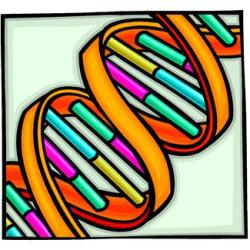Source Institutions
Source Institutions
Add to list Go to activity
Activity link broken? See if it's at the internet archive

Role-playing the parts of chromosomes and centrioles, learners use large chromosome models and nylon cords (spindle fibers and cell membranes) to walk through the processes of mitosis and meiosis. Physical manipulation of the chromosomes and their parts in the process of cell division and replication both clarifies and reinforces some very abstract concepts for learners. The activity demonstrates crossing over and gene linkage. It may be extended to illustrate chromosome anomalies such as deletions and trisomies. Models can be used to show other mutation types as well as x-linkage. A large floor space is needed for this activity.
- 45 to 60 minutes
- 1 to 2 hours
- $10 - $20 per group of students
- Ages 14 - 18
- Activity, Lesson/Lesson Plan, Model, Simulation
- English
Quick Guide
Materials List (per group of students)
- 4 wooden dowels - at least 1 foot long
- plastic tubing - 2 sizes - one that fits over each end of the dowel, a second larger tubing that will fit over the smaller tubing (the latter should be painted)
- nylon rope - two lengths - one to form a nuclear membrane - one to simulate the cell membrane (you may wish to have more than one cell in operation!)
- 4 Velco strips (3 inches each) - to glue around the center of each dowel
- 4 Velcro strips (8 inches each) - for chromosome pairing - wrap around center of chromosomes
- 4 nylon cords ( 6-8 feet long) - for spindle fibers
- 4 latch hooks and 4 eyes - these will attach chromosomes to spindle fibers and permit them to be moved
Subjects
-
Life Sciences
-
Cells
- Cell Structure and Function
- Cell Division
-
Heredity and Genetics
- Human Genetics
- DNA Structure and Function
-
Cells
Informal Categories
- Physical Activity
Audience
To use this activity, learners need to:
- see
- see color
- be mobile
- touch
Learning styles supported:
- Involves hands-on or lab activities
Other
This resource is part of:
Access Rights:
- Free access
By:
- Knowlton Meyer, Tamsen
Rights:
- All rights reserved, Access Excellence @ the National Health Museum, 2009
